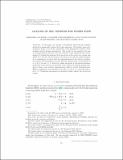| dc.contributor.author | Cockburn, Bernardo | |
| dc.contributor.author | Gopalakrishnan, Jayadeep | |
| dc.contributor.author | Nguyen, Ngoc Cuong | |
| dc.contributor.author | Peraire, Jaime | |
| dc.contributor.author | Sayas, Francisco-Javier | |
| dc.date.accessioned | 2011-12-14T20:05:45Z | |
| dc.date.available | 2011-12-14T20:05:45Z | |
| dc.date.issued | 2010-09 | |
| dc.date.submitted | 2010-01 | |
| dc.identifier.issn | 0025-5718 | |
| dc.identifier.issn | 1088-6842 | |
| dc.identifier.uri | http://hdl.handle.net/1721.1/67680 | |
| dc.description.abstract | In this paper, we analyze a hybridizable discontinuous Galerkin method for numerically solving the Stokes equations. The method uses polynomials of degree $ k$ for all the components of the approximate solution of the gradient-velocity-pressure formulation. The novelty of the analysis is the use of a new projection tailored to the very structure of the numerical traces of the method. It renders the analysis of the projection of the errors very concise and allows us to see that the projection of the error in the velocity superconverges. As a consequence, we prove that the approximations of the velocity gradient, the velocity and the pressure converge with the optimal order of convergence of $ k+1$ in $ L[superscript 2]$ for any $ k [greater than or equal to] 0$. Moreover, taking advantage of the superconvergence properties of the velocity, we introduce a new element-by-element postprocessing to obtain a new velocity approximation which is exactly divergence-free, $ \mathbf{H}($div$ )$-conforming, and converges with order $ k+2$ for $ k[greater than or equal to]1$ and with order $ 1$ for $ k=0$. Numerical experiments are presented which validate the theoretical results. | en_US |
| dc.description.sponsorship | National Science Foundation (U.S.) (grant DMS-0713833) | en_US |
| dc.description.sponsorship | Singapore-MIT Alliance for Research and Technology | en_US |
| dc.description.sponsorship | University of Minnesota. Supercomputer Institute | en_US |
| dc.description.sponsorship | National Science Foundation (U.S.) (Grant SCREMS-0619080) | en_US |
| dc.description.sponsorship | Spain. Ministerio de Educación y Ciencia (MEC/FEDER Project MTM2007–63204) | en_US |
| dc.description.sponsorship | Aragon (Spain) (Grupo PDIE) | en_US |
| dc.language.iso | en_US | |
| dc.publisher | American Mathematical Society | en_US |
| dc.relation.isversionof | http://dx.doi.org/10.1090/S0025-5718-2010-02410-X | en_US |
| dc.rights | Article is made available in accordance with the publisher's policy and may be subject to US copyright law. Please refer to the publisher's site for terms of use. | en_US |
| dc.source | AMS | en_US |
| dc.title | Analysis of HDG Methods for Stokes Flow | en_US |
| dc.type | Article | en_US |
| dc.identifier.citation | Cockburn, Bernardo et al. “Analysis of HDG methods for Stokes flow.” Mathematics of Computation 80.274 (2011): 723-723.© 2011 American Mathematical Society. | en_US |
| dc.contributor.department | Massachusetts Institute of Technology. Department of Aeronautics and Astronautics | en_US |
| dc.contributor.approver | Peraire, Jaime | |
| dc.contributor.mitauthor | Peraire, Jaime | |
| dc.contributor.mitauthor | Nguyen, Ngoc Cuong | |
| dc.relation.journal | Mathematics of Computation | en_US |
| dc.eprint.version | Final published version | en_US |
| dc.type.uri | http://purl.org/eprint/type/JournalArticle | en_US |
| eprint.status | http://purl.org/eprint/status/PeerReviewed | en_US |
| dspace.orderedauthors | Cockburn, Bernardo; Gopalakrishnan, Jayadeep; Nguyen, Ngoc Cuong; Peraire, Jaume; Sayas, Francisco-Javier | en |
| dc.identifier.orcid | https://orcid.org/0000-0002-8556-685X | |
| mit.license | PUBLISHER_POLICY | en_US |
| mit.metadata.status | Complete | |
